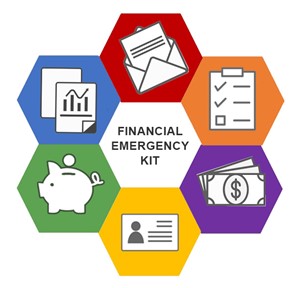COVID-19 Public Health Crisis Creating Worldwide Economic Peril
American Consumer Credit Counseling says every household must act now to gather essential financial and personal documents; emergency resources
Boston MA – March 20, 2020
The global COVID-19 pandemic is creating worldwide economic peril. American households must act now to establish a financial emergency kit and improve readiness for fast-developing events, American Consumer Credit Counseling said today.
The U.S. Treasury is projecting significant increases in unemployment nationwide as entire sectors of the economy have shut down to slow the spread of COVID-19. Surges are affecting access to essentials such as groceries and other supplies in demand and temporary supply shortages. Banks and other lenders are connecting with consumers about programs in place to address and assist with credit defaults.
“This is an unprecedented global health crisis and a formidable situation in the United States. Americans are taking dramatic but necessary measures to protect the health and well-being of their families, and they must include financial readiness in their planning,” said Steve Trumble, President and CEO of American Consumer Credit Counseling. “A financial emergency kit is crucial in this kind of crisis. It means gathering critical documents, records, contact information, and emergency resources in one place to ensure financial preparedness for an unexpected event or dislocation.”
Financial counselors at ACCC are directing clients to excellent online resources such as the Ready.gov section on financial preparedness, and the downloadable EFFAK (Emergency Financial First Aid Kit) guide.
Some of the critical items to assemble, according to these and other financial emergency resources, include:
- All account numbers, passwords, and related account ID credentials for bank accounts, credit cards, loans, utilities, and other services.
For utilities and credit accounts – especially home mortgages – where on-time payment is in question or default appears imminent, be sure to contact creditors and utility companies to discuss options.
- All critical personal and family medical information including prescriptions, medical coverage IDs, doctor and hospital contacts, medical ID bracelets and other information.
- All insurance documents and account numbers including contact info for insurers and agents: life, medical, home, and auto.
- All personal ID and government-issued documents and cards: social security, passport or passport card, Real ID and driver’s license, birth certificates.
- A supply of cash on hand in the event access to banks or bank accounts is interrupted, or ATMs are not functioning or inaccessible. A good rule of thumb for this – if possible to access – is $50 per individual in the household, plus an overall supply (separate from the that) of at least $500 in cash.
- If those sums are not immediately accessible to hold in a financial emergency kit, try to appropriate as close to those sums as possible.
“This is perhaps the most difficult and challenging period we have experienced as a nation in over 100 years,” Trumble said. “But as a nation, we will get through this. And as individual households, being prepared for financial uncertainty or unforeseen events is critical.”
About American Consumer Credit Counseling
American Consumer Credit Counseling (ACCC) is a nonprofit credit counseling 501(c)(3) organization dedicated to empowering consumers to achieve financial management through credit counseling, debt management, bankruptcy counseling, housing counseling, student loan counseling, and financial education concerning debt solutions. To help consumers reach their goal of debt relief, ACCC provides a range of free consumer personal finance resources on a variety of topics including budgeting, credit and debt management, student loan assistance, youth and money, homeownership, identity theft, senior living, and retirement. Consumers can use ACCC’s worksheets, videos, calculators, and blog articles to make the best possible decisions regarding their financial future. ACCC holds an A+ rating with the Better Business Bureau and is a member of the National Foundation for Credit Counseling® (NFCC®). For more information or to access free financial education resources, log on to ConsumerCredit.com or visit https://www.consumercredit.com/debt-resources-tools/

